Navarre Last Name Origin, History, and Meaning
Where did the surname Navarre come from? What does the surname Navarre mean? Discover the history and meaning of the last name Navarre and family migration on YourRoots Map.
Surname Navarre Origin: What does the last name Navarre mean?
The Navarre surname has a rich history dating back to the early 11th century in Spain. Derived from the Basque region, it is associated with the medieval Kingdom of Navarre, known for its distinct Basque features. Over the centuries, the Navarre surname has spread globally, with records indicating its presence in countries like the United States and France. The surname's meaning and origin are deeply rooted in the history of the Pyrenean kingdom, reflecting its unique cultural heritage.
YourRoots data confirms the Navarre surname's historical ties to Spain and France, highlighting its global spread over time. Today, the Navarre surname remains prominent in countries like the United States and France, symbolizing a connection to the medieval Kingdom of Navarre and its Basque roots. The surname's presence in different regions underscores its enduring legacy and cultural significance across diverse populations worldwide.
Navarre Last Name History: Where did the last name Navarre come from?
Origin of Navarre Surname: Where does the last name Navarre originate from?
According to YourRoots data, the surname Navarre first appeared in records from Spain around the early 11th century. Please note that this reflects only YourRoots data for the exact Navarre spelling and does not include other record sources or surname variations.
History of the Last Name Navarre: What does the Navarre surname history look like in the early days?
The Navarre surname remained closely associated with Spain and France from the 11th to the 17th century. YourRoots data also shows Navarre family records in countries like the United States, indicating global spread over the centuries.
Global Spread: Where can we find the Navarre surname today?
By the 20th century, the volume of records with the Navarre surname grew significantly in the United States and France. The Navarre surname remains prominent in the United States, France, and other countries worldwide.
Explore Navarre last name heritage and Navarre surname origin based on YourRoots Map data
 VIEW THE ORIGIN OF SURNAME NAVARRE
VIEW THE ORIGIN OF SURNAME NAVARREFamous People With Navarre Surame?
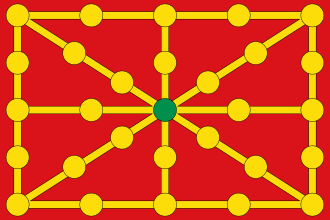
Kingdom of Navarre
Kingdom of Navarre was a medieval state in the Pyrenees, evolving from the city of Pamplona during the Iberian Reconquista. It faced conflicts with the Carolingian Empire and the Umayyad Emirate of Córdoba, leading to partitions and rule by Aragon and France. Eventually, it was merged into the Kingdom of France, with monarchs holding the title "King of France and Navarre." The ancient kingdom covered parts of present-day Spain and France, with the northern region joining France in 1589. Its history is intertwined with the politics of the era, including dynastic disputes and territorial changes.
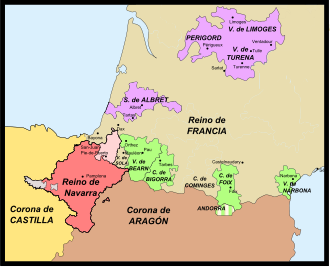
Spanish conquest of Iberian Navarre
The Spanish conquest of Iberian Navarre was led by Ferdinand II of Aragon and completed by his grandson and successor Charles V from 1512 to 1524. This military campaign saw the annexation of Navarre by Spain, dividing it along the Pyrenees. The kingdom lost its independence and was eventually absorbed into France. The conquest was a result of internal instability and external interventions, with Navarre's nobility split into warring factions. The crown's attempts to maintain control and alliances with neighboring kingdoms ultimately led to its downfall. This historical event reshaped the political landscape of the region and marked the end of Navarre's autonomy.
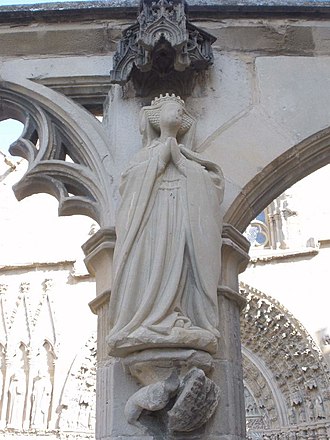
Blanche I of Navarre
Blanche I of Navarre (July 6, 1387 – April 1, 1441) was a powerful queen who ruled over Navarre and Sicily. She served as regent of Sicily and later became the Queen regnant of Navarre. Blanche was known for her regency power, pilgrimage to Santa María del Pilar, and establishing a brotherhood with chivalric traditions. Her legacy lives on through her children and the Spanish Navy frigate Reina Blanca. Blanche's life was filled with royal duties, political struggles, and family challenges, making her a fascinating figure in medieval European history.
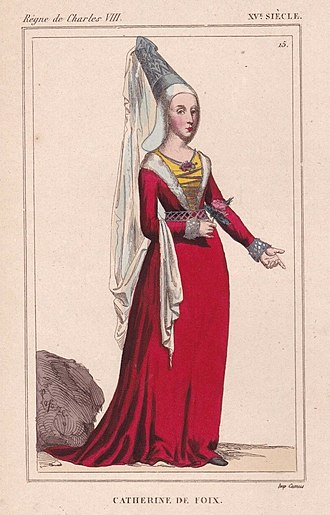
Catherine of Navarre
Catherine of Navarre (1468 – February 12, 1517) was Queen of Navarre from 1483 until 1517. She faced civil war and a Spanish invasion during her reign, ultimately losing control of Navarre to Ferdinand of Aragon. Catherine was known for her courage, prudence, and loyalty to her husband, King John III. Despite her efforts to reclaim her kingdom, she passed away in Mont-de-Marsan.
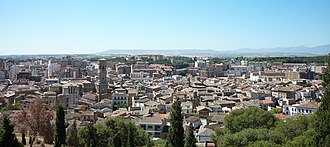
Tudela, Navarre
Tudela Navarre (no birth and death dates available) is a municipality in Spain, known for its rich history and cultural significance. Located in the Ebro valley, it was founded by the Romans and later taken by the Arabs during the Umayyad conquest. Tudela has seen a mix of different religious communities over the centuries, including Muslims, Mozarabs, and Jews. The city boasts a blend of Romanesque, Gothic, and Baroque architecture, with notable sites like the Cathedral of Our Lady of Solitude. Tudela is also famous for its annual festival in honor of Santa Ana, featuring street music, bullfights, and the running of the bulls.
All images displayed on this page are sourced from Wikipedia or Wikimedia Commons.We use these images under their respective Creative Commons or public domain licenses. Wherever applicable, author attributions and license information are provided. If you believe an image is used incorrectly or outside its license terms, please contact us so that we can review and correct the issue.




.png)